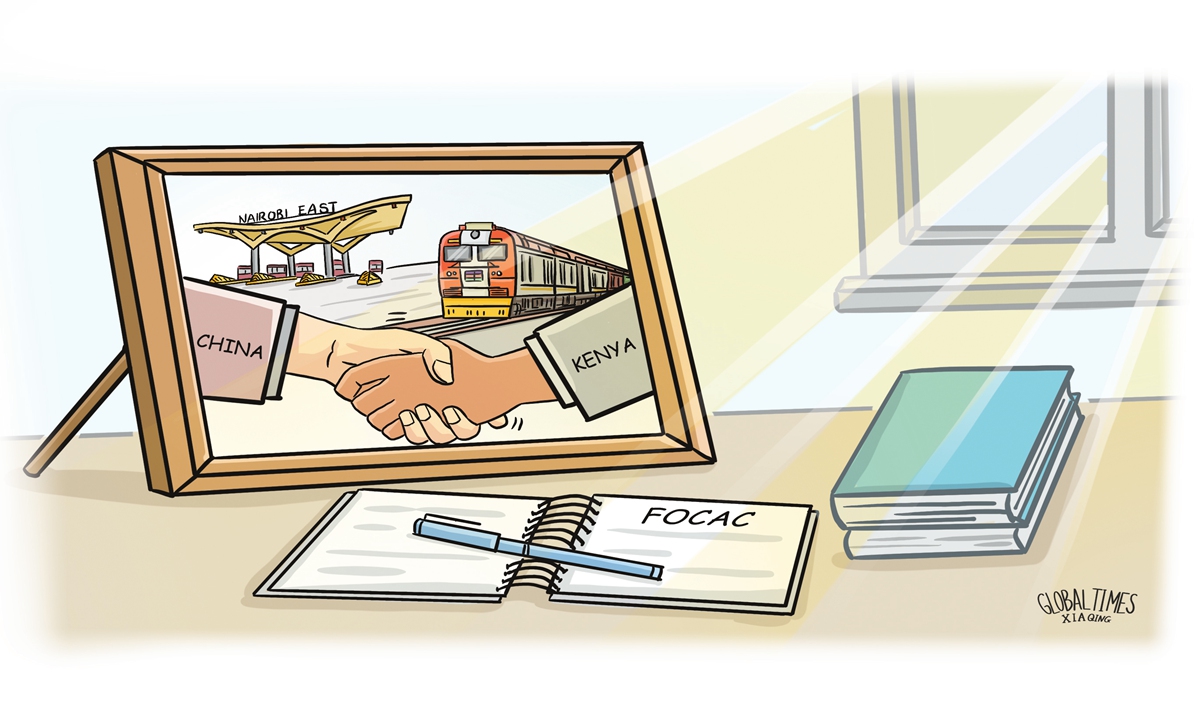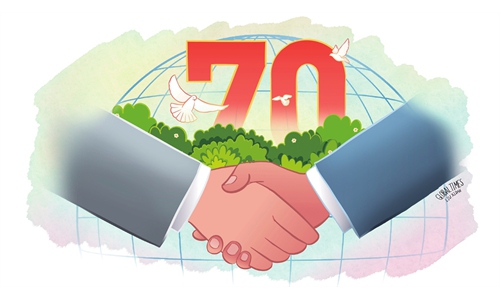
Illustration: Xia Qing/GT
Kenyan President William Ruto concluded his five-day state visit to China on Saturday, underscoring the strengthening of strategic and economic ties between the two countries. This important trip was seen as a pivotal moment in the evolving geopolitical landscape and a reflection of the growing momentum of China-Africa cooperation.
President Ruto held high-level meetings with Chinese President Xi Jinping and other senior Chinese officials during the visit. A series of agreements were signed covering infrastructure development, trade expansion and investment in critical sectors. These achievements are not isolated; they represent the concrete implementation of the outcomes of the Forum on China-Africa Cooperation (FOCAC) held last year. This partnership reaffirms China's role as a key player in Kenya's development story, offering financial and technological support in areas where many traditional Western partners have become more cautious or selective.
The broader significance of Ruto's visit comes into sharper focus against the backdrop of rising global economic tensions, including the imposition of new US tariffs and an increasingly fragmented international trade environment. For Kenya, and indeed much of Africa, the current climate demands diversification of partnerships and a shift toward alternative models of growth. Cooperation with China, therefore, is not just a strategic choice - it is a development opportunity born out of necessity and vision.
One of the major announcements during Ruto's trip was Kenya's interest in joining the BRICS group, which recently expanded its membership to include additional emerging economies. Kenya's possible accession to BRICS highlights a broader trend among developing countries that are seeking greater agency in global governance. The move signals Kenya's intention to align more closely with the Global South, promoting new platforms for dialogue, cooperation and economic development outside of the traditional Western-dominated structures.
Joining BRICS would potentially offer Kenya access to new markets, diversified sources of investment and greater influence in shaping the future of global financial and trade systems. It would also tie into broader African ambitions to accelerate industrialization, regional integration and infrastructure connectivity.
For China, Ruto's visit is equally significant. Strengthening relations with Kenya - East Africa's economic powerhouse - enhances China-proposed Belt and Road Initiative (BRI) footprint across the continent and further establishes China as a preferred partner for African nations seeking development without political interference. The visit also reinforced the message that China stands ready to work with Africa in building a multipolar world order based on mutual respect, equality, mutual benefit and win-win results.
Moreover, this visit is a testament to the effectiveness of mechanisms like FOCAC in translating diplomatic goodwill into actionable projects and real development outcomes. Over the past two decades, FOCAC has evolved from a political dialogue platform into a results-oriented mechanism that has delivered significant infrastructure, trade and capacity-building initiatives across Africa.
In the context of rising protectionism, economic decoupling and uncertainty in global markets, the renewed China-Kenya partnership signals a shared commitment to openness and resilience. It demonstrates that South-South cooperation - particularly between China and African countries - is not just a rhetorical ideal, but a practical and increasingly successful development model.
President Ruto's visit also fits within a larger story of Global South countries taking more control over their development pathways. Whether through diversified economic ties, participation in new multilateral groupings like BRICS or enhanced regional integration efforts, countries like Kenya are actively reshaping their futures rather than remaining passive players in a global system often marked by inequity.
As the world navigates an era of profound geopolitical and economic transformation, Ruto's China trip stands as a milestone. It highlights the opportunities that come from embracing new partnerships, implementing shared visions like those laid out at FOCAC and exploring innovative forms of cooperation that respond to today's development challenges.
The outcomes of this visit will not only impact China-Kenya relations but also serve as an example for other African nations seeking to maximize their development opportunities through South-South collaboration. In a time of global uncertainty, the deepening ties between China and Kenya offer a model of cooperation grounded in mutual benefit, shared aspirations and a collective commitment to a more inclusive global future.
The author is deputy director of capacity building of the President Office of Kenya. opinion@globaltimes.com.cn



